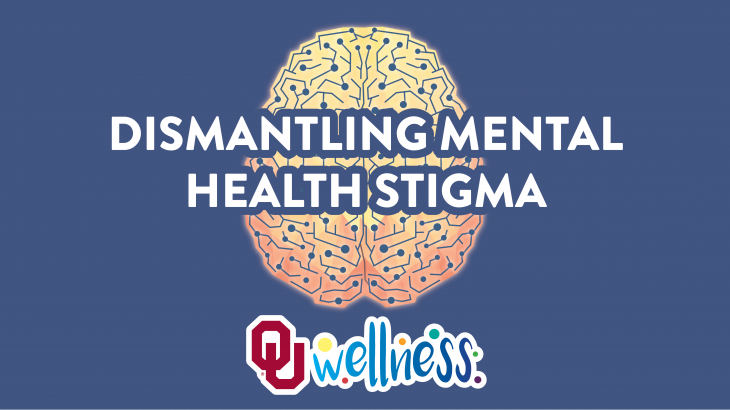From Emily Morrow, Health Educator, OU Health Services
“Crazy.”
“Weak.”
“It’s all in your head.”
“This weather is bipolar.”
“I’m so OCD.”
Words have powerful meanings, making the way we talk about mental illness extremely important. May is Mental Health Awareness Month, dedicated to raising awareness about the stigmatizing misconceptions and language we use as a society when referring to individuals with a mental illness.
Stigmatizing terms are those that bring shame to a person for something that is out of their control. It minimizes experiences and misrepresents reality. Stigma has been a part of our society for a long time and is a leading reason why many individuals do not seek treatment for their mental health illness. Concern that it may impact their employment, the way people perceive them, or appearing weak are just a few of the negative impacts. Every day, in every way, we need to stand up to stigma.
How can we stand up to stigma? Here are four simple steps to get started.
- Educate yourself and others. Take the time to learn the truth about mental illnesses. Learn the symptoms of and how you can help those around you suffering from depression, anxiety and other mental illnesses. When you educate yourself, you will better understand them. For example, if your friend suffers from social anxiety and cancels dinner plans at the last minute, you will understand how difficult social outings can be for him/her/they. Work to educate others. When you hear stigmatizing or negative comments, kindly but firmly correct the person making them.
- Be conscious of language. Use person-first language. Do not use mental health conditions as objectives. Calling someone OCD because he/she/they likes to keep things organized, or referring to someone as bipolar because he/she/they is in a good mood and suddenly shifts to a bad mood undermines the legitimate diagnosis. A person is not defined by a condition.
- Show compassion for those with mental illness. It can be difficult to understand something you have never experienced, making it easy to want to minimize what someone is going through. Mental illness can make even such basic day-to-day tasks as getting out of bed going to work, and hanging out with friends difficult. Be a friend who provides a safe space where others can open up about their struggles and truly be heard. Showing compassion does not mean you have to know all the answers or have advice to give. Just being there for someone has enormous impact on their self-worth and well-being.
- Let the media know when they are being stigmatizing. The media (movies, television shows, news stories) often portray mental illness in a stereotypical and negative way, reinforcing myths and prejudices. For example, many crime television shows will show characters experiencing mental illness as violent criminals or intellectually different and childish. They are often portrayed as looking different (i.e. clothing, hair) and seen as being all alike. In most cases, these portrayals are far from reality. We as a society can take action by writing the news channel or broadcast company when we see negative storylines and comments.
This month, I challenge you to become more aware of the words you use when talking about mental illness and become active in spreading mental health awareness to those around you. Mental health misconceptions and stigma will not end overnight. It is going to take each and every one of us taking action. Mental illness is real and we must fight to #curestigma.
If you would like to further educate yourself on this important topic, I encourage you to attend the OU Wellness Lunch and Learn “Mental Health First Aid” May, 31, noon in Rawls Engineering Practice Facility, Room 200. We will discuss common mental health illnesses, stigmatizing behaviors and ways we can offer better support to those around us.
https://www.nami.org/Blogs/From-the-CEO/May-2018/Let-s-Cure-the-Social-Virus-Known-as-Stigma
https://www.nami.org/blogs/nami-blog/october-2017/9-ways-to-fight-mental-health-stigma
